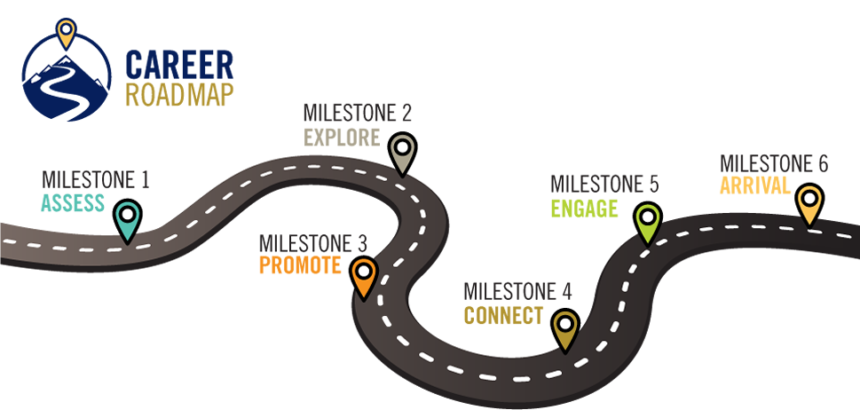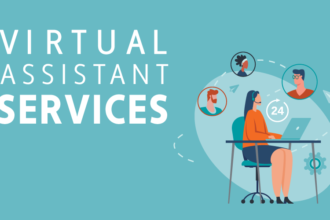Creating a Career Roadmap That Works
In today’s rapidly changing job market, having a clear career direction is more important than ever. Many professionals find themselves stagnating, feeling lost, or overwhelmed by the multitude of choices and uncertainties that accompany career development. The secret to navigating this complex landscape lies in creating a well-thought-out career roadmap—a strategic plan that guides your decisions, helps you set realistic goals, and keeps you motivated to achieve your aspirations.
- Creating a Career Roadmap That Works
- Why a Career Roadmap Matters
- Step 1: Self-Assessment—Understand Your “Why,” Strengths, and Interests
- Tools to help:
- Step 2: Define Your Long-Term Vision
- Step 3: Set SMART Goals
- Step 4: Identify Needed Skills and Experiences
- Step 5: Develop Actionable Strategies
- Step 6: Create a Flexible Timeline and Review Process
- Step 7: Maintain Motivation and Resilience
- Final Thoughts
- Why a Career Roadmap Matters
This post will walk you through the essential steps to craft a personalized and effective career roadmap that aligns with your values, skills, passions, and long-term ambitions.
Why a Career Roadmap Matters
Before diving into the steps, it’s important to understand why having a career roadmap is crucial:
- Clarity and Focus: It helps you define your goals clearly, reducing the confusion that often accompanies broad career aspirations.
- Motivation and Confidence: Knowing the path ahead keeps you motivated, even when faced with setbacks.
- Resource Optimization: It guides you on where to invest your time and effort, whether in acquiring new skills, networking, or gaining experience.
- Adaptability: A flexible plan allows you to adjust as circumstances, interests, or markets change.
Without a roadmap, you risk aimlessly wandering, missing opportunities, or feeling unfulfilled despite your efforts.
Step 1: Self-Assessment—Understand Your “Why,” Strengths, and Interests
Every effective roadmap begins with self-awareness. Take stock of your current situation:
- Identify your core values: What principles drive you? Is it creativity, stability, impact, flexibility, or something else?
- Assess your skills and strengths: What are you naturally good at? What skills have you developed? Consider both hard skills (technical abilities) and soft skills (communication, leadership).
- Recognize your passions: What activities, industries, or roles excite you? What tasks make you lose track of time?
- Determine your constraints: Consider factors like family commitments, financial needs, geographical preferences, or health considerations.
Tools to help:
- Personal SWOT analysis (Strengths, Weaknesses, Opportunities, Threats)
- Journaling your goals and motivations
- Feedback from mentors, peers, or supervisors
Understanding your “why” and where your strengths lie is essential for creating a roadmap that aligns with your authentic self.
Step 2: Define Your Long-Term Vision
With self-awareness in hand, articulate where you want to be in the next 5, 10, or even 20 years:
- What position or role do you see yourself in?
- Which industry or field do you want to work in?
- What kind of impact do you hope to make?
- What lifestyle do you aspire to (e.g., work-life balance, income level, location)?
Your long-term vision acts as your North Star—guiding your decisions and keeping you focused.
Have you read: Where Do People Work as Digital Marketers? Exploring Career Opportunities in the Digital Marketing Landscape
Step 3: Set SMART Goals
Break down your long-term vision into manageable, measurable, and actionable goals by using the SMART framework:
- Specific: Clearly define what you want to achieve.
- Measurable: Ensure you can track your progress.
- Achievable: Set realistic goals aligned with your current situation and resources.
- Relevant: Goals should directly support your long-term vision.
- Time-bound: Assign deadlines to maintain motivation and accountability.
Example:
“Obtain a managerial position in the marketing department within three years by completing a leadership certification and gaining relevant experience.”
Step 4: Identify Needed Skills and Experiences
Based on your goals, determine what skills, knowledge, or experiences you need to acquire:
- Formal education or certifications
- On-the-job experience or special projects
- Networking and mentorship opportunities
- Soft skills development (e.g., negotiation, emotional intelligence)
Create a learning plan with timelines and resources (courses, workshops, books) to bridge gaps.
Step 5: Develop Actionable Strategies
Outline HOW you’ll achieve your goals. This includes:
- Building your network: Attend industry events, join professional associations, or engage on LinkedIn.
- Gaining relevant experience: Volunteer for challenging projects, seek cross-functional roles, or pursue internships.
- Enhancing your skills: Enroll in targeted training programs.
- Seeking mentorship: Find mentors who can guide, support, and open doors for you.
- Personal brand building: Share your expertise through writing, speaking engagements, or social media.
Make sure each strategy is aligned with your goals and resources.
Step 6: Create a Flexible Timeline and Review Process
Your career roadmap shouldn’t be rigid. Life changes, market shifts, and new interests may necessitate adjustments:
- Set periodic review milestones (e.g., every 6 months or annually).
- Track your progress and celebrate milestones.
- Be prepared to reassess your goals and strategies, refining your plan when needed.
Regularly revisiting your roadmap ensures continued relevance and motivation.
Step 7: Maintain Motivation and Resilience
The journey toward your goals may have setbacks. Develop resilience by:
- Cultivating a growth mindset—view setbacks as opportunities to learn.
- Seeking support networks (mentors, peers).
- Practicing mindfulness and self-care.
- Staying adaptable and open to new opportunities.
Remember that career development is a marathon, not a sprint.
Final Thoughts
Creating a career roadmap that works is less about having a rigid 10-year plan and more about establishing a guiding framework that reflects your evolving aspirations and circumstances. It requires honest self-assessment, clear goal-setting, strategic actions, and regular reviews.
By following these steps, you’re positioning yourself to take control of your professional journey. The roadmap provides clarity, focus, and motivation, empowering you to turn your ambitions into reality.
Start today—assess where you are, define where you want to go, and craft a plan that propels you forward. Your future self will thank you.






